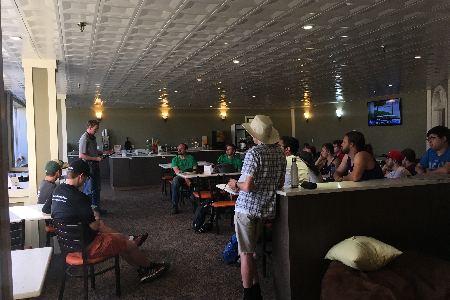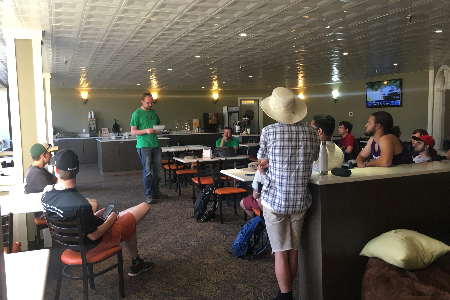Team Resources
CSTAG encourages new and prospective rover teams to rover competitions to reach out to the community of established teams for advice in getting started. If you have specific questions, you are welcome to contact us for advice on the details of our competition and what it takes to succeed.
CIRC organizers take no responsibility for arranging team transportation, deliveries, food, tools, or accommodations. For registered international teams, we will provide confirmation of competition registration to each team member requiring a visa to visit Canada.
Informational Resources
- CIRC Logistics Guide
- Transport Canada UAV Guidelines
- Canadian Border Services Agency website
- Canadian Radio Equipment Standards
We’ve run some webinars to provide information on how to succeed at CIRC, the slides from those webinars are on the competition pages.
Supporter-Provided Resources
To be announced for 2025. Teams are often granted special access to materials and software through supporters of the event.
Advice from the Organizers
Over the last several years, we have noticed a lot of teams struggling for the same few reasons. We have compiled a list of some things to keep in mind to ensure a smoother competition experience. Hopefully you find these suggestions useful!
First of all, test, test, test! One of the biggest mistakes made by those in the competition (and often engineers in the field) is allowing insufficient time for testing and revision. You will not achieve perfection with the first iteration of your rover, no matter how long you spend designing it. We encourage you to try making proof-of-concept parts using cheap methods that can provide quick feedback on your design. Proper testing also ensures everything works together correctly in a realistic setting. For example, the first time you are attempting to operate your drill via a camera feed over a wireless connection should not be at Location 1 of Surface Sampling!
Limit the scope of your redesign efforts. Be realistic about your team’s availability and prioritize your work. It is better to reuse a part with known and manageable flaws than replace it with something unproven which will fail in new and exciting ways. If your team has the resources for a complete redesign each year, make sure you track the progress of each task and have a plan B if something doesn’t get finished.
A consequence of insufficient testing is inexperienced rover operators. An operator with more than an hour or two of realistic practice with the rover (via camera and sensor feedback, without physically watching the rover) is very rare, and is the easiest way to gain a competitive edge.
CIRC Rover Design Guide
Refer to the CIRC Rover Design Guide for more information and tips on building your rover.
Competition Safety Information
Inclement Weather
Typical summer weather events such as rain showers or thunderstorms may occur during the competition weekend. More severe events such as hailstorms or tornado watches are rare but possible. CIRC organizers may adjust the event schedule as required to minimize the hazard presented to participants and rovers. Please note that rovers may be expected to operate in light rain.
Hazards
We encourage you follow the guidelines below for a safe and enjoyable competition experience. Each attendee is responsible for their own personal safety, and for understanding all risks that may be encountered, some of which are listed below:
- Drumheller is sunny, hot, and dry, with summer temperatures exceeding 33°C.
- Wear sunscreen (SPF 50+), a hat, and UV-blocking sunglasses while outdoors.
- Carry a large water bottle and drink plenty of water. Drinking water is available at CIRC central and all task sites.
- During the hottest parts of the day, limit time outdoors to prevent heatstroke. CIRC Central is an air conditioned facility where you can rest and work on your rover in comfort.
- Task sites are undeveloped, and contain steep slopes and loose surfaces.
- Walk carefully to avoid tripping or sliding on uneven ground.
- Wear long clothing and enclosed footwear. Cactus and thorny plants are common.
- Avoid steep slopes to prevent injury and reduce environmental impact.
- The clay-based soil in Drumheller becomes exceptionally slippery when wet.
- Do not approach wildlife. Venomous snakes are occasionally sighted in the area.
- Working on rovers can be hazardous.
- Exercise caution with all tools and wear appropriate safety equipment.
- Ensure bystanders keep a safe distance from active rovers and work areas.
- Work which presents a significant risk to bystanders or the facility should take place outdoors and well away from members of the public.
Emergency Information
- In the event of an emergency, dial 9-1-1
- The nearest medical facility is Drumheller Health Centre at 351 9 St NW.
- The Drumheller Health Centre emergency room is always open.
Pharmacies
- Shoppers Drug Mart (41 Railway Ave W)
- Riverside Value Drug Mart (167 Centre St)
- Medicine Shoppe (101 6 Ave SE)

